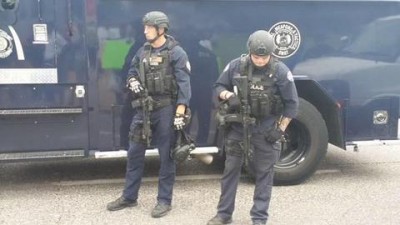
In 2014, I was flattered to have been approached by the American Civil Liberties Union (ACLU) Shasta Chapter to be their keynote speaker to address Government Secrecy, Drones, and Militarization. After each police involved death, I would revisit my notes and wonder why I never published them. After watching this video clip on my FB page on July 10, 2016, I decided to share an excerpt from the ACLU address of April 13, 2014.
(Of note, at the time of the talk, “Black Lives Matter” had not appeared on the national stage, nor had the training of police in Israel been fully exposed; as such, these very important factors were not included in the talk/excerpt below. The following is simply talking points stringed together and lacks the flow and flare of academic writing.)
Historians and political scientists have warned us about dangerous war fever sweeping the United States. Today we have gone beyond that.
The “Global War on Terror”, a war indefinite in duration, against an ill-defined and shifting enemy, al-Qaeda, [ISIS did not exist in the official narrative at the time] is now being armed in Syria [“moderates”] without a clear explanation of American strategy or a specific definition of victory, or even a way to measure progress in the struggle has taken its toll on civil liberty. The problem of militarization poses a danger to the very character of American government and society.
In his first public interview after retiring from active duty in 2003, General Tommy Franks identified the single most dangerous possibility offered by an endless war on terrorism: An attack with weapons of mass destruction “just to create casualties … to terrify” could lead “the western world, the free world” to forfeit its “freedom and liberty,” to lose its democracy, and “begin to militarize our country in order to avoid a repeat of another mass-casualty event, … to potentially unravel the fabric of our Constitution.”
Over half a century ago, Supreme Court Justice Robert Jackson concluded that “by giving way to the passion, intolerance and suspicions of wartime, it is easy to reduce our liberties to a shadow, often in answer to exaggerated claims of security.”.
That day is here. Not only are we under constant surveillance, but take for example the kill list. A list which began under the Bush administration as a rationale for murdering suspect citizens of countries with which the United States was not at war has become Obama’s kill list and the scope of the list has been expanded to include the execution, without due process of law, of U.S. citizens accused, without evidence presented in court, of association with terrorism. And this is accepted by the people. No protests.
The Framers of the Constitution recognized such dangers when they carefully subordinated the military to civilian authority and attempted to limit the power of the President to initiate war.
Gregory Foster, a former Army officer and West Point graduate who now teaches national security studies at the National Defense University in Washington said that principle of civilian control of the military—an early building block of American democracy- has become the civilian subjugation to the military.
Today, the degree to which society’s institutions, policies, behavior, thought, and values are devoted to military power and shaped by war are alarming.
The incursion of military recruiters and teachings into the public school system is well known. Presidents favor speaking to captive audiences at military bases, defense bases, and on aircraft carriers. Lawmakers’ constant use of “support our troops” to justify defense spending. TV programs and video games like “NCIS,” “Homeland” and “Call of Duty,” to reality show “Stars Earn Stripes,” demonstrate that Americans are subjected to a daily diet of stories that valorize the military while the storytellers pursue their own opportunistic political and commercial agendas
Former secretary of defense Donald Rumsfeld acknowledged publicly in an October 24, 2003, interview in the Washington Times: “We are in a war of ideas, as well as a global war on terror. Ideas are important, and they need to be marshaled, and they need to be communicated in ways that are persuasive to the listeners.”
This was part of his Information Operations Roadmap. As part of the plan, public affairs officers were given the task of briefing journalists. In 2005 it came to light that the Pentagon paid the Lincoln Group (a private company) to plant ‘hundreds of stories’ in Iraqi papers in support of U.S. Policies
But now, we see that this war has been internalized, whether you look at drones, kill list, or militarization of the police force.
During the Clinton administration, Congress passed what’s now known as the “1033 Program,” which formalized Reagan administration’s directive to the Pentagon to share surplus military gear with domestic police agencies. Since then, millions of pieces of military equipment designed for use on a battlefield have been transferred to local cops—SWAT teams and others—including machine guns, tanks, armored personnel carriers, etc.
The Pentagon’s 1033 program has exploded under Obama.
Bill Clinton also created the “Troops to Cops” program which offered grants to police departments who hired soldiers returning from battle, contributing even further to the militarization of the police force.
In a 2005 PBS documentary, David Grossman, a retired US Army Lt. Colonel spoke of training law enforcement groups worldwise to kill: “most of what I do is I train military and law enforcement in what I call the bulletproof mind.” “Prior preparation is that one variable in the equation that we can control ahead of time, and one of the key things is embracing the responsibility to kill. So when I teach, one of the things I believe we need to do is embrace this word “kill.””
Is it any wonder that [Mayor] Bloomberg proudly bragged of “hav(ing) my own army in the NYPD” and who used that army to spy on peaceful Occupy Wall Street protestors?

